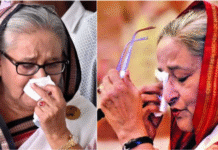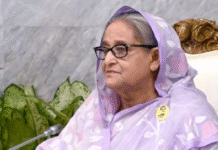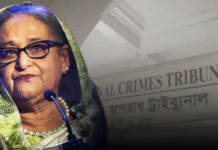
Credit: Reuters/Andrew Biraj
By Anis Ahmed
Feb 17 (Reuters) – Bangladesh’s parliament, meeting the demands of protesters thronging the capital, amended a law on Sunday allowing the state to appeal any verdict in war crimes trials it deems inadequate and out of step with public opinion.
Tens of thousands of demonstrators jamming central Shahbag Square for the 13th day burst into cheers amid driving rain as the assembly approved the changes.
The protesters have been demanding the death penalty for war crimes after a tribunal this month sentenced a prominent Islamist to life in prison in connection with Bangladesh’s 1971 war of independence from Pakistan.
The life sentence pronounced on Abdul Quader Mollah, assistant Secretary General of the Jamaat-e-Islami party, for murder, rape and torture had stunned many Bangaldeshis.
The amendment will “empower the tribunals to try and punish any organizations, including Jamaat-e-Islami, for committing crimes during country’s liberation war in 1971”, Law Minister Shafique Ahmed said after the change was approved.
Lawyers said the amendment sets a timetable for the government to appeal against Mollah’s sentence and secure a retrial. The previous law did not allow state prosecutors to call for a retrial except in the case of acquittals.
Adoption was quick — less than a week after the amendment was approved by the cabinet in the overwhelmingly Muslim country of 150 million.
OPPOSITION BOYCOTTS PARLIAMENT
Opposition benches were empty as the Bangladesh Nationalist Party (the BNP) of former premier Begum Khaleda Zia and its allies have been boycotting sessions almost since her arch rival, Sheikh Hasina, leader of the Awami League, took office in 2009.
The BNP accuses the prime minister of using the war crimes tribunal as a weapon against its opponents. Hasina denies the allegation.
In its first verdict last month, the tribunal sentenced a former Jamaat leader, Abul Kamal Azad, also an Islamic preacher, to death in absentia for similar offences.
Eight other Jamaat leaders, including its current and former chiefs, are being tried by the war crimes court that Hasina set up in 2010 to investigate abuses during the 1971 conflict. Three million people were killed and thousands of women were raped.
The government is facing growing pressure from the protesters to ban Jamaat-e-Islami, the country’s largest Islamist party, and groups linked to it.
Students and teachers throughout the country hoisted the national flag and sang the national anthem simultaneously to support the demonstrators’ call to put war criminals to death.
Law minister Shafique Ahmed told reporters the government was considering such a ban.
Jamaat activists have called a country-wide strike for Monday, but demonstrators and many shopkeepers have pledged to resist any attempt to enforce such a stoppage.
Demonstrators have shown new resolve after the killing on Friday of one of the protest leaders, a popular blogger.
Bangladesh became part of Pakistan at the end of British rule in 1947 but broke away in 1971 after a war between Bangladeshi nationalists, backed by India, and Pakistani forces.
Some factions in what was then East Pakistan opposed the break with Pakistan. Jamaat denies accusations that it opposed independence and helped the Pakistani army.
(Editing by Ron Popeski)
Source: Reuters









